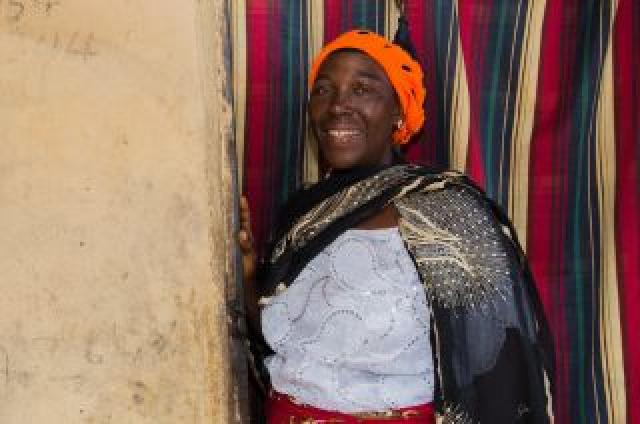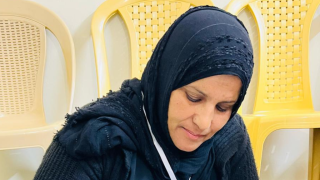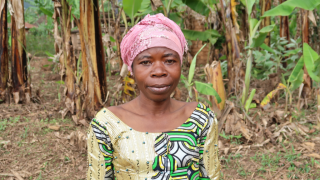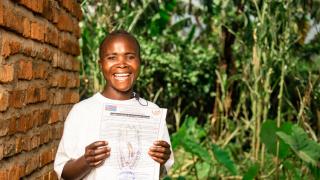Grace's story
This is my story
Redefining Menstrual Care through Reusable Period Pads
My name is Grace Baren. I am a mother of three children living in Jos town, Nigeria. Since I was young, I have experienced insurmountable challenges, including being forced to drop out of school, being forced into marriage and experiencing violence.
The height of the violence was in 2012. I had just visited my mother with my children and we were in the house when suddenly we heard gunshots. Gunmen had raided our village. They instructed women and children to gather at the village centre. After a while, our traditional horn was blown, indicating danger and we were told to run and hide.
I was pregnant then. I held my children tight and ran as far as my legs would take me.
When I saw an old man enter the river to hide, I joined him. Using one hand to hold my daughter while my son was on my back, I held on to a plant with thorns so the water would not carry us away. We stayed in the river till the next day, and by the time we returned to our village, most of the houses were burned to the ground, including our home, properties and even the silo where we stored grains.
In 2016, tragedy struck once more as my husband passed away, leaving me to care for my children amidst rejection and hardship. A few months after he was buried, the larger family told me I had to marry his younger brother. When I refused, I was forced to go back to my mother's place. Determined to change my fate, I started selling rice cakes and joined a tailoring programme for widows in my community so I could take care of my children.
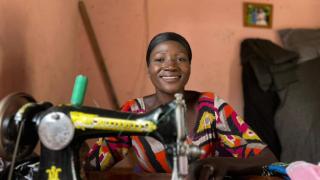
While working in the market, I noticed incredible transformations in women I knew who took part in the Women for Women International programme. It was a powerful reminder of the impact the programme could have on a woman like me. I fervently prayed for another opportunity.
In May 2023, my prayers were answered when Women for Women International returned to enrol more women. I was fortunate to be selected for the second group.
I could not wait to return to the classroom after so many years. I gained valuable skills and nurtured great connections with other women.
With the knowledge gained from the Stronger Women, Stronger Nations programme, I was selected for a two-week training on reusable menstrual pads. Alongside nine other participants, I learnt about the production, packaging and branding of eco-friendly reusable period pads. This experience was incredibly rewarding. After completing the training, I used the acquired skills to make my reusable pads in the comfort of my home.
Getting this skill is an outstanding achievement, as I have always been concerned about how women and girls in my community manage their periods.
Most of them use unhygienic materials like rags, leaves and even cow dung because they cannot afford disposable period pads. This practice exposes them to various health problems that are difficult to treat. Through the training, I have managed to educate them on the dangers of using these unhygienic materials and introduced them to reusable period pads made from healthy materials. These pads are durable, washable and can be reused for many, many months. I have successfully marketed and sold several packs and made a profit!

Now, I work with other group members, exchanging ideas on marketing strategies and ways to reach a larger market for our innovative product. We are confident that we will make considerable progress over time. I am also teaching my two daughters how to produce the pads, and my eldest daughter, Christiana, who is in secondary school, uses the pads.
She also educates the girls in her school on menstrual hygiene.
Besides the profit I make, improving menstrual hygiene in my community is a significant achievement for me.
Read more
Saleha
subtitle:
"This is the first time I have the confidence to share my story."
After surviving conflict and tremendous loss, Saleha is finding ways to rebuild her life and care for her eight children. Read Saleha's story, shared in her own words.
Marie Jeanne
subtitle:
The involvement of women in decision-making processes is essential for a balanced and equitable society. However, men are in control of the processes in Marie Jeanne’s community. Read about how she has fought for women’s voices to be heard in community gatherings, and dared to challenge other injustices too. #SheDares to speak up on behalf of all the women in her community.
Angelique
subtitle:
Many women in the Democratic Republic of the Congo don't own their own land - even though most farmworkers are women and despite laws in place to protect their right to it. Read about how Angelique's journey through out programme led her to become a Change Agent and persuading a skeptical community that she had just as much right to own land as her husband.

